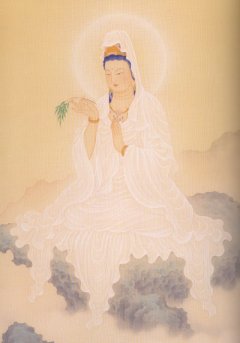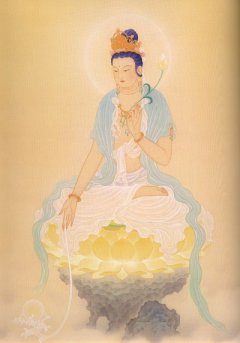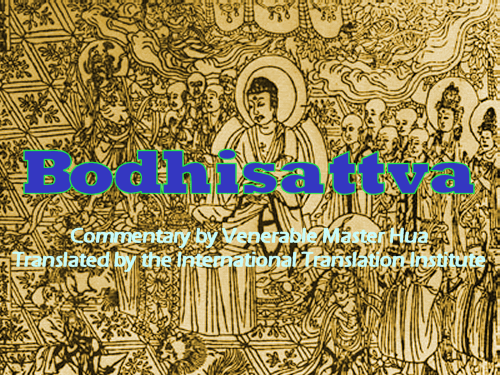Sentient beings become enlightened,
Jumping out from the dust.
The Six Paramitas and Ten Thousand Practices,
At all times we build upon and nurture them.
 Sentient
beings become enlightened. "Bodhisattva" is a Sanskrit
word. "Bodhi" is enlightenment. "Sattva" is a sentient
being. A Bodhisattva is an enlightened being, an enlightened one among
sentient beings, who enlightens others with the principles he enlightened
to. Within enlightenment, he is one who understands things; by way of
his understanding, he is one who cultivates; and, within cultivation,
he is one who really practices. He is also called" A living being
with a great resolve for the Way." He is a living being and, yet,
he has a great mind for the Way. Another name for him is "Guiding
Hero"; he is a hero who guides the way for living beings. Sentient
beings become enlightened. "Bodhisattva" is a Sanskrit
word. "Bodhi" is enlightenment. "Sattva" is a sentient
being. A Bodhisattva is an enlightened being, an enlightened one among
sentient beings, who enlightens others with the principles he enlightened
to. Within enlightenment, he is one who understands things; by way of
his understanding, he is one who cultivates; and, within cultivation,
he is one who really practices. He is also called" A living being
with a great resolve for the Way." He is a living being and, yet,
he has a great mind for the Way. Another name for him is "Guiding
Hero"; he is a hero who guides the way for living beings.
Jumping out of the dust. If you have become enlightened, you
have jumped out of the defilement of the dust. If not, then you cannot
jump out of it. Having jumped out of the dust, you will not live for
the three basics: food, clothing, and shelter. Rather, you diligently
cultivate the Six Paramitas and Ten Thousand Practices. In cultivating
the Bodhisattva Way, there are no traces of others or a self. Without
the trace of self or others, one cultivates the Six Paramitas and Ten
Thousand Practices.
The Six Paramitas are: giving, upholding precepts, patience,
vigor, Samadhi and Prajna. Giving: This means you should give to others,
not that others should give to you. Upholding precepts: You must stop
doing any evil and do only good. Patience: Most important is patience.
You must endure what others cannot endure. Vigor: Not to be remiss for
a minute. Samadhi: You must sit in meditation to cultivate the skill
of concentration. Prajna: Wisdom is a requirement for cultivation. People
with wisdom will work hard to cultivate at all times, and in all places.
 Moreover,
a Bodhisattva must practice the Four Dharmas of Attraction: 1) Giving:
He fosters a mind of giving universally to all living beings. 2) Gentle
Speech: A Bodhisattva has a heart of kindness for living beings. Without
discrimination between others and himself, he treats them as he would
wish to be treated. And so he is willing to liberate others, which is
the same as liberating himself. 3) Benefiting: A Bodhisattva should
do anything that is of benefit to living beings. 4) Cooperation: A Bodhisattva
has myriad transformation bodies. When he sees living beings, he knows
which body should be used to cross them over, and he will appear in
that body to teach and transform them. Moreover,
a Bodhisattva must practice the Four Dharmas of Attraction: 1) Giving:
He fosters a mind of giving universally to all living beings. 2) Gentle
Speech: A Bodhisattva has a heart of kindness for living beings. Without
discrimination between others and himself, he treats them as he would
wish to be treated. And so he is willing to liberate others, which is
the same as liberating himself. 3) Benefiting: A Bodhisattva should
do anything that is of benefit to living beings. 4) Cooperation: A Bodhisattva
has myriad transformation bodies. When he sees living beings, he knows
which body should be used to cross them over, and he will appear in
that body to teach and transform them.
At all times we build upon and nurture them. It is not that
I cultivate today, but not tomorrow; I cultivate this year, but not
next year; I cultivate this life, l but not next life. In every hour
and minute, life after life, you must cultivate the Six Paramitas and
Ten Thousand Practices. If you can do what others can't do, you are
a Bodhisattva.
|


 Sentient
beings become enlightened. "Bodhisattva" is a Sanskrit
word. "Bodhi" is enlightenment. "Sattva" is a sentient
being. A Bodhisattva is an enlightened being, an enlightened one among
sentient beings, who enlightens others with the principles he enlightened
to. Within enlightenment, he is one who understands things; by way of
his understanding, he is one who cultivates; and, within cultivation,
he is one who really practices. He is also called" A living being
with a great resolve for the Way." He is a living being and, yet,
he has a great mind for the Way. Another name for him is "Guiding
Hero"; he is a hero who guides the way for living beings.
Sentient
beings become enlightened. "Bodhisattva" is a Sanskrit
word. "Bodhi" is enlightenment. "Sattva" is a sentient
being. A Bodhisattva is an enlightened being, an enlightened one among
sentient beings, who enlightens others with the principles he enlightened
to. Within enlightenment, he is one who understands things; by way of
his understanding, he is one who cultivates; and, within cultivation,
he is one who really practices. He is also called" A living being
with a great resolve for the Way." He is a living being and, yet,
he has a great mind for the Way. Another name for him is "Guiding
Hero"; he is a hero who guides the way for living beings. Moreover,
a Bodhisattva must practice the Four Dharmas of Attraction: 1) Giving:
He fosters a mind of giving universally to all living beings. 2) Gentle
Speech: A Bodhisattva has a heart of kindness for living beings. Without
discrimination between others and himself, he treats them as he would
wish to be treated. And so he is willing to liberate others, which is
the same as liberating himself. 3) Benefiting: A Bodhisattva should
do anything that is of benefit to living beings. 4) Cooperation: A Bodhisattva
has myriad transformation bodies. When he sees living beings, he knows
which body should be used to cross them over, and he will appear in
that body to teach and transform them.
Moreover,
a Bodhisattva must practice the Four Dharmas of Attraction: 1) Giving:
He fosters a mind of giving universally to all living beings. 2) Gentle
Speech: A Bodhisattva has a heart of kindness for living beings. Without
discrimination between others and himself, he treats them as he would
wish to be treated. And so he is willing to liberate others, which is
the same as liberating himself. 3) Benefiting: A Bodhisattva should
do anything that is of benefit to living beings. 4) Cooperation: A Bodhisattva
has myriad transformation bodies. When he sees living beings, he knows
which body should be used to cross them over, and he will appear in
that body to teach and transform them.